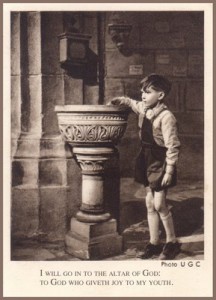 From a reader…
From a reader…
QUAERITUR:
I saw a meme today to the effect of:
Humidifiers fill air with water molecules from a source of water. If that source of water was Holy Water, would it essentially cleanse the room of all evil?
GUEST PRIEST RESPONSE: Fr. Tim Ferguson
Holy Steam, Batman…
Holy Water is a very effective sacramental of the Church. The Church uses Holy Water for blessing people, things, places, and for casting out demons. One enters very tenuous territory when one starts attributing magical properties to the Church’s sacramentals. When a room is blessed with Holy Water, and the water evaporates – is the room still blessed? Of course! While a powerful sacramental, there’s nothing magical about the Holy Water itself.
Sacramentals lose their character as sacramentals when they cease to be objectively what they were as sacramentals. My first rosary, as a child, was used pretty roughly. I would take it on bike rides, and it occasionally swung into the spokes. I prayed it traipsing through the woods, and swimming in the lake. Once the original rosary case had fallen apart, my rosary shared space in my pants pocket with coins, interesting stones and twigs and all sorts of the flotsam and jetsam of my boyhood. It went through the washer and dryer on more than one occasion. When the first Hail Mary bead fell off, I simply made a mental note to add another prayer to that decade. Then when the second one fell, and the third one, and the fourth one – by the time I entered the college seminary, there were a total of twelve beads remaining on my rosary. It had effectively ceased being the blessed, sacramental rosary it was when I first got it. I buried it respectfully in our local cemetery, but kept the crucifix, which was still in good shape.
When Holy Water ceases to be water – when it evaporates – is ceases to be Holy Water.
Now, the scientific minded among you are saying – well, what if it evaporates in the Holy Water bottle on a hot day, but then condenses in that same bottle? Or, if it freezes, it ceases to be water and become ice – but then if it melts? (Many times in Northern Michigan, the Holy Water stoup freezes and folks have to break the layer of ice to get at the water in the bottom).
Well, those questions are above my paygrade. I certainly think it would be prudent to have fresh holy water on hand at all times. If there’s some doubt about whether by freezing and thawing, or evaporating and condensing it has lost it’s blessing, simple pour it into the ground (respectfully) and ask you friendly neighborhood priest to use the ancient ritual (rather than the execrable Book of (Non)Blessings) and bless some more.


































Also, it would be really bad for the humidifier. Think of the salt buildup in the reservoir!
The reformed liturgy calls for “living water” so what’s the problem??
(parody, not to be taken seriously)
Fr. Tim, I love your Rosary story from when you were a boy.
Our Pastor tells us all the time that if you drop a Sacramental you pick it up quickly and kiss it and make the Sign of the Cross with it. He stresses how important it is to protect them and to treat them with respect.
Follow-up question (though I did not pose the original question):
about the “pouring into the ground” when you have some Holy Water which is either doubtful, as you say, or which you want to put away for another not impious reason.
I have instinct enough not to flush it down a toilet, but what about a (clean) normal sink? or watering an indoor plant?